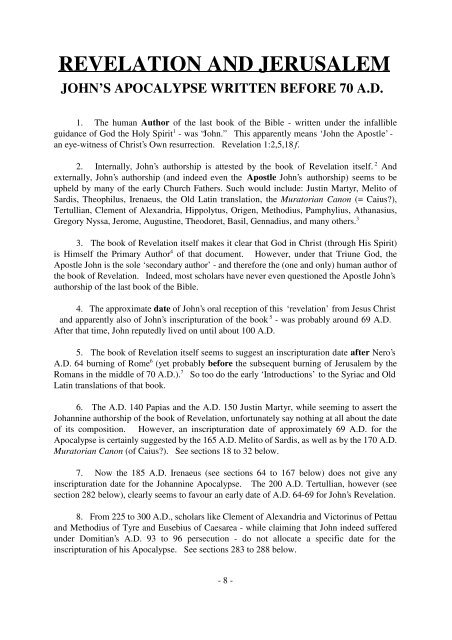JERUSALEM; ROME; REVELATION - The Preterist Archive
JERUSALEM; ROME; REVELATION - The Preterist Archive
JERUSALEM; ROME; REVELATION - The Preterist Archive
You also want an ePaper? Increase the reach of your titles
YUMPU automatically turns print PDFs into web optimized ePapers that Google loves.
<strong>REVELATION</strong> AND <strong>JERUSALEM</strong><br />
JOHN’S APOCALYPSE WRITTEN BEFORE 70 A.D.<br />
1. <strong>The</strong> human Author of the last book of the Bible - written under the infallible<br />
guidance of God the Holy Spirit 1 - was “John.” This apparently means ‘John the Apostle’ -<br />
an eye-witness of Christ’s Own resurrection. Revelation 1:2,5,18 f.<br />
2. Internally, John’s authorship is attested by the book of Revelation itself. 2 And<br />
externally, John’s authorship (and indeed even the Apostle John’s authorship) seems to be<br />
upheld by many of the early Church Fathers. Such would include: Justin Martyr, Melito of<br />
Sardis, <strong>The</strong>ophilus, Irenaeus, the Old Latin translation, the Muratorian Canon (= Caius?),<br />
Tertullian, Clement of Alexandria, Hippolytus, Origen, Methodius, Pamphylius, Athanasius,<br />
Gregory Nyssa, Jerome, Augustine, <strong>The</strong>odoret, Basil, Gennadius, and many others. 3<br />
3. <strong>The</strong> book of Revelation itself makes it clear that God in Christ (through His Spirit)<br />
is Himself the Primary Author 4 of that document. However, under that Triune God, the<br />
Apostle John is the sole ‘secondary author’ - and therefore the (one and only) human author of<br />
the book of Revelation. Indeed, most scholars have never even questioned the Apostle John’s<br />
authorship of the last book of the Bible.<br />
4. <strong>The</strong> approximate date of John’s oral reception of this ‘revelation’ from Jesus Christ<br />
and apparently also of John’s inscripturation of the book 5 - was probably around 69 A.D.<br />
After that time, John reputedly lived on until about 100 A.D.<br />
5. <strong>The</strong> book of Revelation itself seems to suggest an inscripturation date after Nero’s<br />
A.D. 64 burning of Rome 6 (yet probably before the subsequent burning of Jerusalem by the<br />
Romans in the middle of 70 A.D.). 7 So too do the early ‘Introductions’ to the Syriac and Old<br />
Latin translations of that book.<br />
6. <strong>The</strong> A.D. 140 Papias and the A.D. 150 Justin Martyr, while seeming to assert the<br />
Johannine authorship of the book of Revelation, unfortunately say nothing at all about the date<br />
of its composition. However, an inscripturation date of approximately 69 A.D. for the<br />
Apocalypse is certainly suggested by the 165 A.D. Melito of Sardis, as well as by the 170 A.D.<br />
Muratorian Canon (of Caius?). See sections 18 to 32 below.<br />
7. Now the 185 A.D. Irenaeus (see sections 64 to 167 below) does not give any<br />
inscripturation date for the Johannine Apocalypse. <strong>The</strong> 200 A.D. Tertullian, however (see<br />
section 282 below), clearly seems to favour an early date of A.D. 64-69 for John’s Revelation.<br />
8. From 225 to 300 A.D., scholars like Clement of Alexandria and Victorinus of Pettau<br />
and Methodius of Tyre and Eusebius of Caesarea - while claiming that John indeed suffered<br />
under Domitian’s A.D. 93 to 96 persecution - do not allocate a specific date for the<br />
inscripturation of his Apocalypse. See sections 283 to 288 below.<br />
- 8 -
















